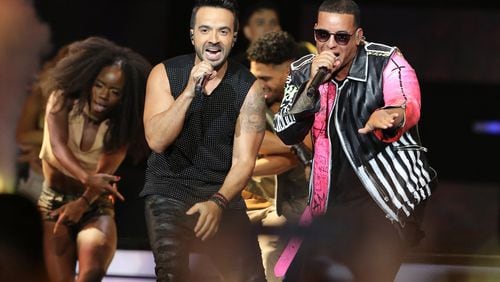“Despacito… Quiero respirar tu cuello despacito, deja que te diga cosas al oído, para que te acuerdes si no estás conmigo…” Unless you’ve been living under a rock the last few months, you’ve probably heard these lyrics on the radio, thanks to Luis Fonsi and Daddy Yankee’s infectious reggaetón smash, “Despacito.”
It is the No. 1 song of the summer, according to Billboard magazine. It has also become the most streamed song of all time, with 4.6 billion streams globally across all major platforms. It is also the most-watched video in YouTube history, surpassing 3 billion views.
“Despacito” is a true musical phenomenon that highlights the contagious rhythms, dances, moves and music of Latin American countries.
“With guitar in hand, searching for the perfect combination of lyrics and melody … my priority was always to create a song full of joy, movement and sensuality, [a song] that when the world heard it, you’d have no choice but to sing along and dance to it,” Puerto Rican songwriter Fonsi said in a press release.
The pop hit, which was picked up and remixed by Justin Bieber, has an irresistibly catchy chorus and beat. It is nearly impossible not to sway your hips and sing along when it comes on.
“Long live Spanish music,” declared Fonsi on his Instagram account, following the song’s massive success.
For Latinos in the U.S., “Despacito” is more than a pop tune. It has served as a welcomed reminder of the richness of our countries, the beauty of our language and the success that can be achieved when talent comes together without division in race, nationality or language.
Luis Fonsi and Daddy Yankee made us all proud with their original opus. But, as Fonsi has indicated in interviews, it was Justin Bieber embracing the song and making a remix, preserving the Spanish and singing in a perfect Spanish accent, that made the song the cultural phenomenon that it is today.
This is not the first time that Latinos have proudly witnessed their music gain popularity in this country. Who can forget “La Macarena,” by Los Del Rio, which was released in 1996 and reached first place on the Billboard Hot 100 Chart? Or “La Bamba,” which was originally sung by Ritchie Valens and soared to the top of the Billboard Hot 100 chart in 1987, thanks to a popular cover by Los Lobos.
But these days, as a Latina mother, it has been enlightening to see my kids singing in Spanish and proud of their heritage when they are able to translate and tell their friends what the lyrics of the song mean.
While dancing at school with teachers and friends, Hispanic classmates of my daughter, Vanessa, sang the song and even tried to show their teacher how to correctly pronounce the words.
“Do you know Spanish?” she is asked.
“Yes, I do,” said my daughter to her friend at a classmate’s party.
“What does it say?”
“Slowly,” explained Vanessa, all the while dancing along.
So, my little girl, who doesn’t always appear proud of her Latin heritage and sometimes seems ashamed of speaking Spanish, is now proud to talk the language of her mom, dad and grandparents. Through music, she has discovered that speaking Spanish is not a disadvantage and that nobody will make her feel ashamed, especially when she is surrounded by young peers at school.
“Despacito” is a shining example of the valuable contributions that Latinos bring to this country. Contributions that we will honor and highlight during Hispanic Heritage Month, a period of recognition from Sept. 15 tol Oct. 12. It celebrates the anniversary of independence of five Latin American countries: Costa Rica, El Salvador, Guatemala, Honduras and Nicaragua, followed by Mexico on Sept 16.
The month is a time to learn about and recognize the histories, cultures and contributions of American citizens whose ancestors came from Spain, Mexico, the Caribbean and Central and South America.
About the Author






